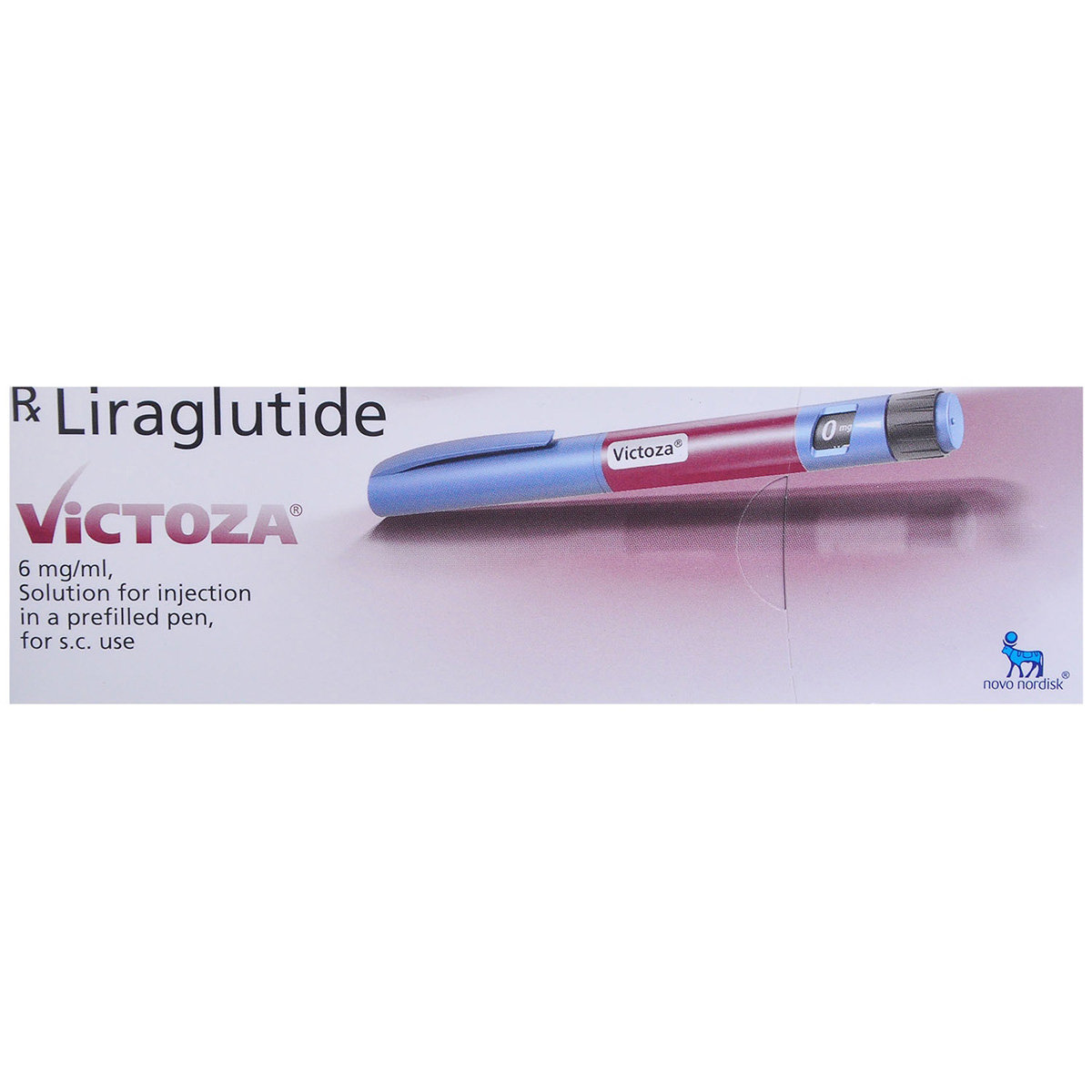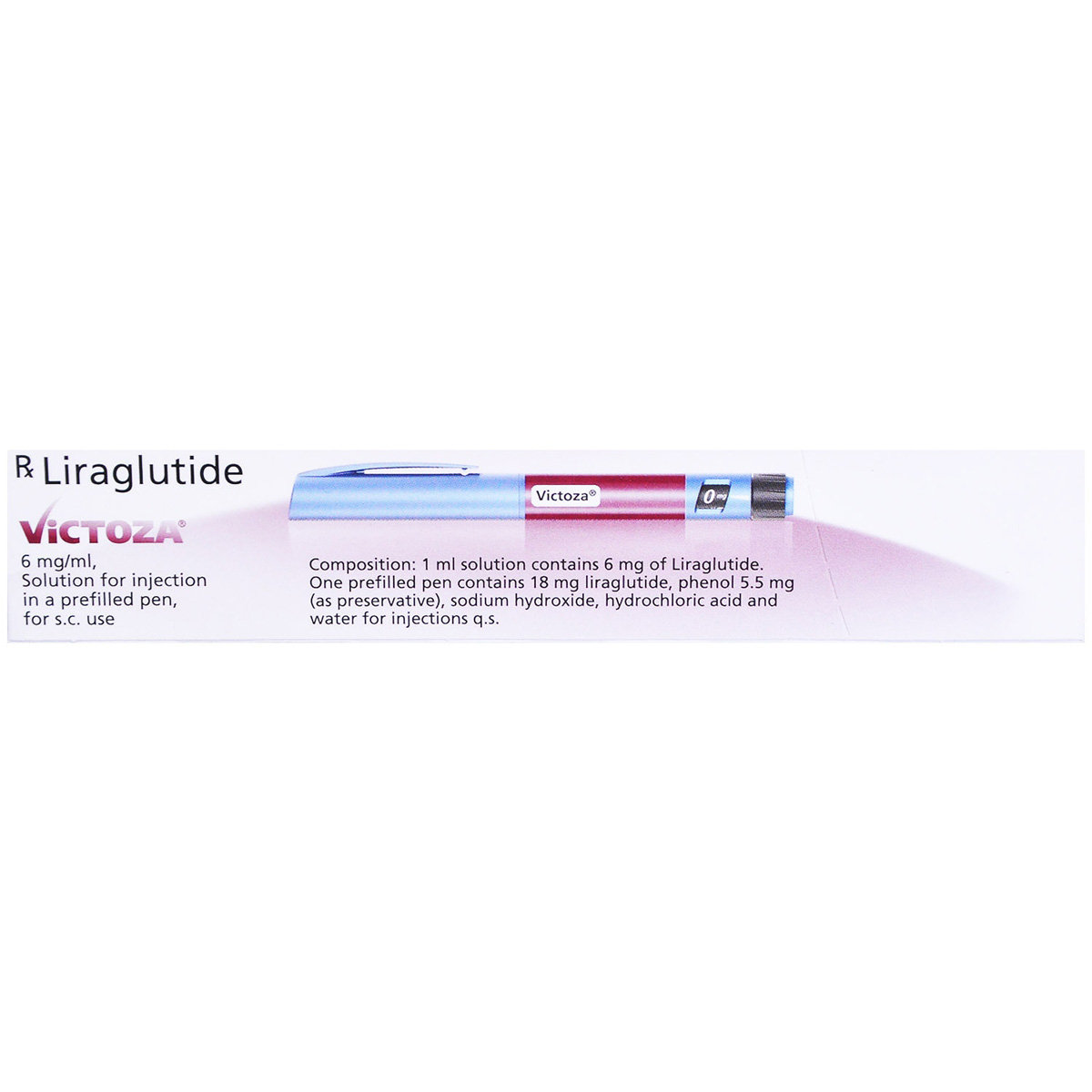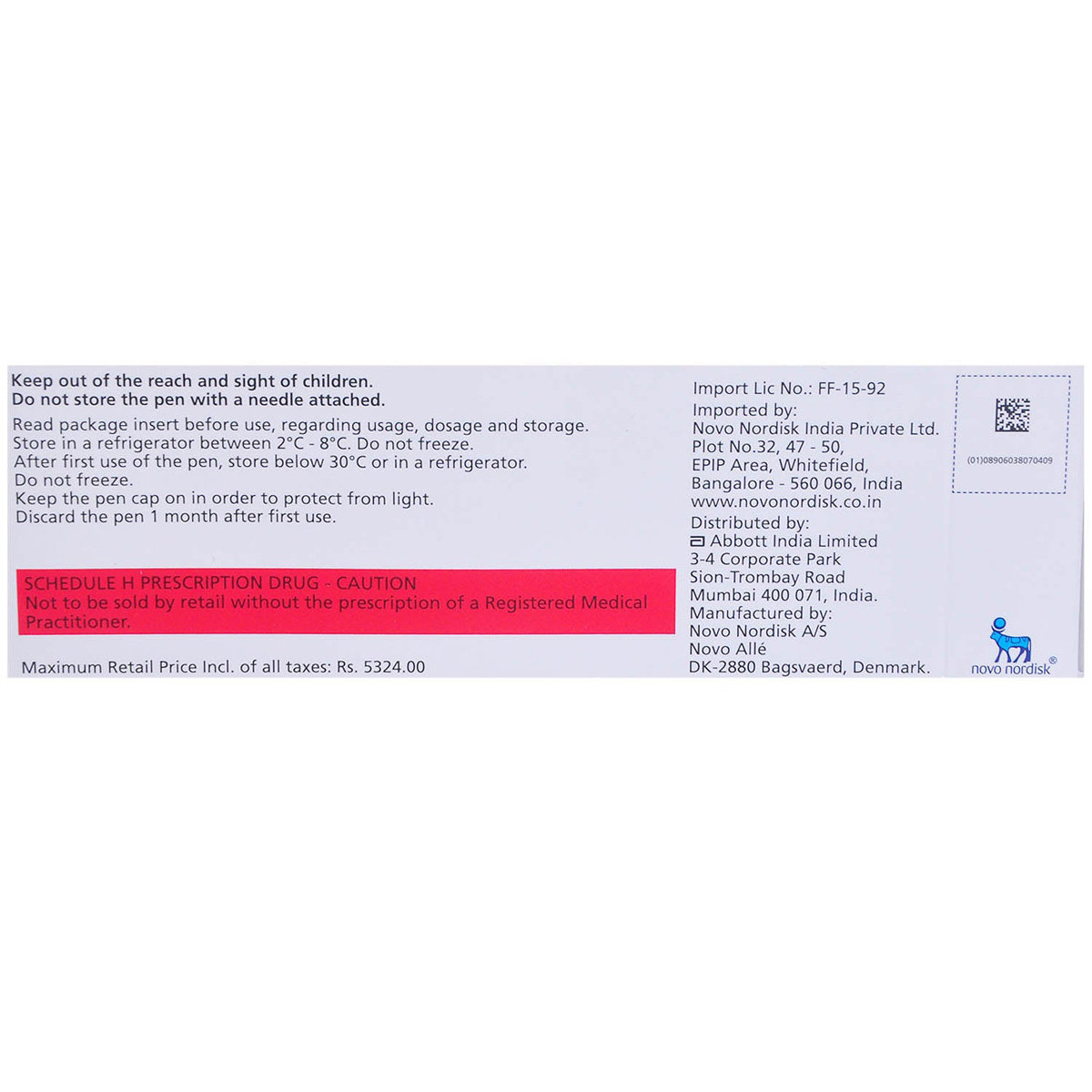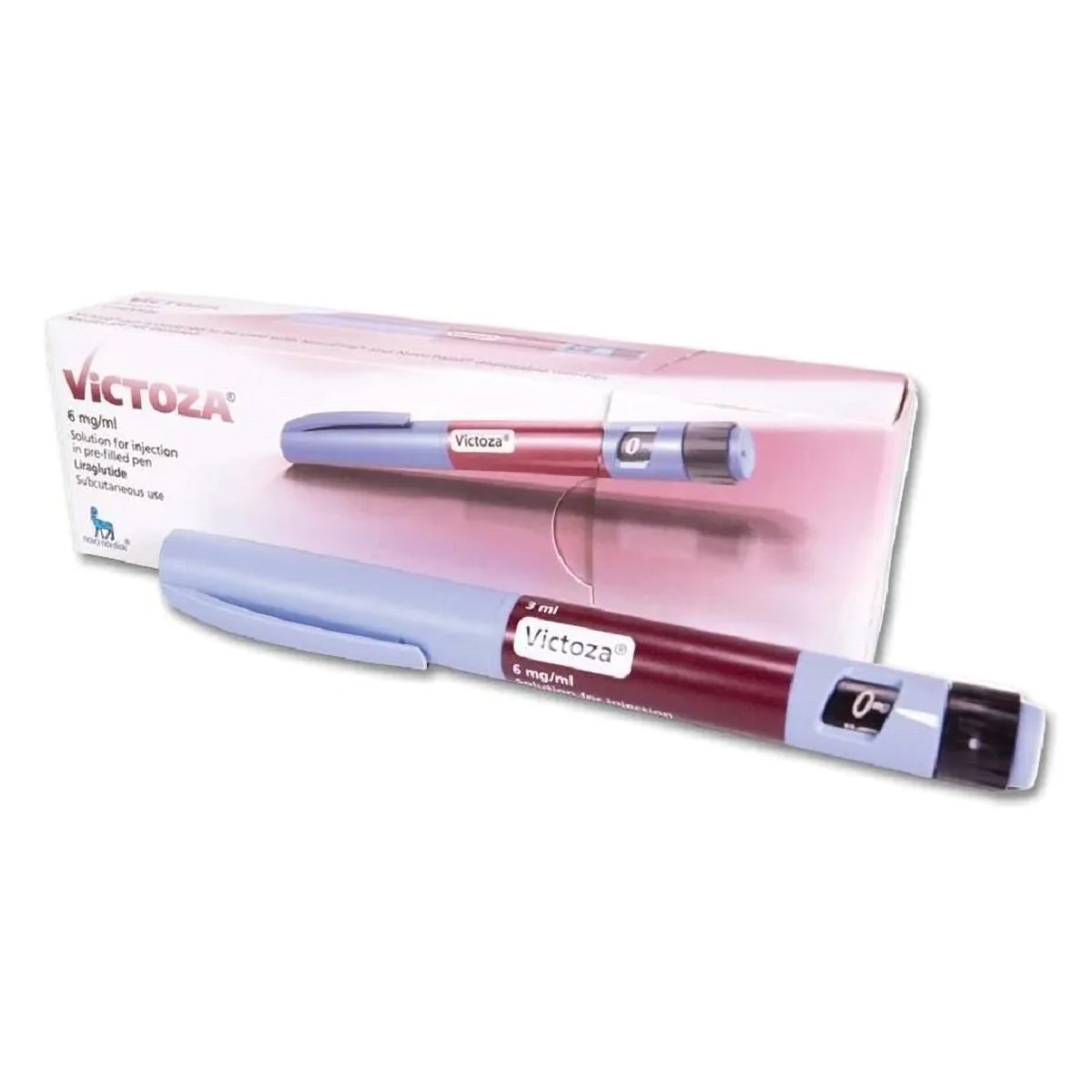Victoza Solution for Injection 3 ml
MRP ₹4991
(Inclusive of all Taxes)
₹748.6 Cashback (15%)
Provide Delivery Location
Online payment accepted
 Prescription drug
Prescription drugWhats That
Composition :
Manufacturer/Marketer :
Consume Type :
Expires on or after :
Return Policy :
About Victoza Solution for Injection 3 ml
Victoza Solution for Injection 3 ml belongs to the class of anti-diabetic drugs, primarily used to treat type 2 diabetes mellitus in the children above 10 years and adult. Diabetes mellitus is a metabolic disease that causes high blood sugar levels. Type 2 diabetes occurs when a hormone released by the pancreas to lower blood glucose called 'insulin' is secreted but unable to get utilized by our body's cell to produce energy.
Victoza Solution for Injection 3 ml contains Liraglutide a recombinant Deoxyribonucleic acid (rDNA) which works by increasing insulin release from the pancreas during high blood sugar levels (after meal) and decreases the amount of sugar the liver makes. Victoza Solution for Injection 3 ml also slows stomach emptying time, thereby decreasing appetite and promotes weight loss in an individual.
Some common side effects of Victoza Solution for Injection 3 ml include nausea, vomiting, diarrhoea, decreased appetite, stomach upset, constipation, headache, feeling tired, rash, and dizziness. These side effects are not familiar to everyone and vary individually. If you notice any side effects that are not manageable, please consult your doctor.
Before starting Victoza Solution for Injection 3 ml, let your doctor know if you have any medical history of heart, kidney or liver diseases, pancreatitis (inflammation of the pancreas), and stomach disorders like gastroparesis (delayed gastric emptying). Do not take or stop this medicine, if the doctor did not advise you to do so. Do not concurrently use Victoza Solution for Injection 3 ml with prandial insulin (mealtime insulin). It is advised to limit your alcohol intake while using Victoza Solution for Injection 3 ml to avoid low blood sugar levels further. Pregnant and breastfeeding women should consult their doctor before starting Victoza Solution for Injection 3 ml.
Uses of Victoza Solution for Injection 3 ml
Directions for Use
Key Benefits
Victoza Solution for Injection 3 ml treats type 2 diabetes mellitus and contains ‘Liraglutide’. It is a recombinant DNA (rDNA) that mimics the action of a natural hormone called Incretin (metabolic hormone, which stimulates a decrease in blood glucose levels). It works by increasing insulin release from the pancreas during high blood sugar levels (after meal) and decreases the amount of sugar the liver makes. Victoza Solution for Injection 3 ml may be advised with or without other medications along with diet and exercise to control blood sugar levels.
Storage
- If you experience low blood sugar levels, inform your doctor. They will assess the severity and make recommendations for the next actions.
- Your doctor will assess your symptoms, blood sugar levels, and overall health before recommending the best course of action, which may include treatment, lifestyle modifications, or prescription adjustments.
- Follow your doctor's instructions carefully to manage the episode and adjust your treatment plan.
- Make medication adjustments as recommended by your doctor to prevent future episodes.
- Implement diet and lifestyle modifications as your doctor advises to manage low blood sugar levels.
- Monitor your blood sugar levels closely for patterns and changes.
- Track your progress by recording your blood sugar levels, food intake, and physical activity.
- Seek further guidance from your doctor if symptoms persist or worsen so that your treatment plan can be revised.
- Inform your doctor about the nausea and discuss possible alternatives to the medication or adjustments to the dosage.
- Divide your daily food intake into smaller, more frequent meals to reduce nausea.
- Opt for bland, easily digestible foods like crackers, toast, plain rice, bananas, and applesauce.
- Avoid certain foods that can trigger nausea, such as fatty, greasy, spicy, and smelly foods.
- Drink plenty of fluids, such as water, clear broth, or electrolyte-rich beverages like coconut water or sports drinks.
- Use ginger (tea, ale, or candies) to help relieve nausea.
- Get adequate rest and also avoid strenuous activities that can worsen nausea.
- Talk to your doctor about taking anti-nausea medication if your nausea is severe.
- Record when your nausea occurs, what triggers it, and what provides relief to help you identify patterns and manage your symptoms more effectively.
- Preventing Vomiting (Before it Happens)
- Take medication exactly as prescribed by your doctor. This can help minimize side effects, including vomiting.
- Having a small meal before taking your medication can help reduce nausea and vomiting.
- Talk to your doctor about taking anti-nausea medication along with your prescribed medication.
- Managing Vomiting (If it Happens)
- Try taking ginger in the form of tea, ale, or candy to help alleviate nausea and vomiting.
- What to Do if Vomiting Persists
- Consult your doctor if vomiting continues or worsens, consult the doctor for guidance on adjusting your medication or additional treatment.
- Inform Your Doctor: Notify your doctor immediately about your diarrhoea symptoms. This allows them to adjust your medication or provide guidance on managing side effects.
- Stay Hydrated: Drink plenty of fluids to replace lost water and electrolytes. Choose water, clear broth, and electrolyte-rich drinks. Avoid carbonated or caffeinated beverages to effectively rehydrate your body.
- Follow a Bland Diet: Eat easy-to-digest foods to help firm up your stool and settle your stomach. Try incorporating bananas, rice, applesauce, toast, plain crackers, and boiled vegetables into your diet.
- Avoid Trigger Foods: Steer clear of foods that can worsen diarrhoea, such as spicy, fatty, or greasy foods, high-fibre foods, and dairy products (especially if you're lactose intolerant).
- Practice Good Hygiene: Maintain good hygiene to prevent the spread of infection. To stay healthy, wash your hands frequently, clean and disinfect surfaces regularly, and avoid exchanging personal belongings with others.
- Take Anti-Diarrheal Medications: If your doctor advises, anti-diarrheal medications such as loperamide might help manage diarrhoea symptoms. Always follow your doctor's directions.
- Keep track of your diarrhoea symptoms. If they don't get better or worse or are accompanied by severe stomach pain, blood, or dehydration signs (like extreme thirst or dark urine), seek medical help.
- Inform your doctor about your constipation symptoms. They may adjust your medication or advise alternative treatments.
- Stay hydrated by drinking sufficient of water (at least 8-10 glasses a day) to help soften stool and promote bowel movements.
- Increase fibre intake by eating foods high in fibre, such as fruits, whole grains, vegetables and legumes, to help bulk up the stool.
- Establish a bowel routine by trying to go to the bathroom at the same time each day to train your bowels.
- Engaging in regular exercise, like walking or yoga, can support in bowel movement stimulation.
- Consult your doctor if constipation persists, and discuss alternative treatments or adjustments to your medication.
- Injection site reaction can include numbness or redness.
- Get a physical examination, follow your doctor's instructions, if it worsens or gets swollen.
- Apply cold compress for pain relief.
- Practice good hygiene and keep the injection site away from heat and pressure.
- Consult your doctor if you experience skin redness, itching, or irritation after taking medication.
- Your doctor may adjust your treatment plan by changing your medication or providing guidance on managing your erythema symptoms.
- Your doctor may recommend or prescribe certain medications to help alleviate symptoms.
- Apply cool compresses or calamine lotion to the affected skin area to reduce redness and itching.
- Stay hydrated by drinking plenty of water to help alleviate symptoms and keep your skin hydrated.
- Monitor your skin condition closely and promptly report any changes, worsening symptoms, or concerns to your healthcare provider.
Drug Warnings
Brief your medical history if you have any heart, kidney or liver diseases, pancreatitis (inflammation of the pancreas), stomach disorders like gastroparesis (delayed gastric emptying), high cholesterol levels, gallbladder problems, and depression before starting Victoza Solution for Injection 3 ml. Victoza Solution for Injection 3 ml is contraindicated in patients with multiple endocrine neoplasia type 2 (tumours in thyroid and parathyroid glands) and personal or family history of thyroid cancer. Do not concurrently use Victoza Solution for Injection 3 ml with prandial insulin (mealtime insulin). If you are also using insulin, take Victoza Solution for Injection 3 ml and insulin injections separately. Please do not mix them. You can inject both injections in the same body region, but the injection sites should not be next to each other. Do not share an injection pen, cartridge, or syringe with another person, even if the needle is changed. It is advised to limit your alcohol intake while using Victoza Solution for Injection 3 ml to avoid low blood sugar levels further. Pregnant and breastfeeding women should consult their doctor before starting this medication. Victoza Solution for Injection 3 ml is advised to be only used in children above ten years of age and adults.
Drug-Drug Interactions
Drug-Drug Interactions
Login/Sign Up
Coadministration of Victoza Solution for Injection 3 ml with Gatifloxacin may sometimes affect blood glucose levels.
How to manage the interaction:
Victoza Solution for Injection 3 ml with Gatifloxacin can cause an interaction but can be taken if prescribed by the doctor. Do not stop using any medications without talking to a doctor.
Drug-Food Interactions
Drug-Food Interactions
Login/Sign Up
Diet & Lifestyle Advise
- Maintain a fibre-rich diet and include healthy carbohydrates from fruits, vegetables and whole grains to maintain your blood glucose levels.
- Eat at regular intervals.
- Keep a check on your weight and exercise regularly to keep your heart healthy.
- Your doctor also guides you on noticing and managing the early symptoms of high/low blood sugar levels.
- Gastrointestinal side effects can be managed with simple modifications in your lifestyle. These include cutting down on sugars and fatty foods, avoiding carbonated drinks and foods that cause gas.
Side Effects of Victoza Solution for Injection 3 ml
- Nausea
- Vomiting
- Diarrhoea
- Decreased appetite
- Stomach upset
- Constipation
- Headache
- Feeling tired
- Rash
- Dizziness
Habit Forming
Therapeutic Class
All Substitutes & Brand Comparisons
RX
Lirafit 6 mg/ml Prefilled Pen 3 ml
Glenmark Pharmaceuticals Ltd
₹1905
(₹571.5/ 1ml)
58% CHEAPERRX
Out of StockGliptoza Pfp Cartridge Injection 3 ml
Eris Life Sciences Ltd
₹1875
(₹625.0/ 1ml)
54% CHEAPERRX
Out of StockLyrato Pfs Catridge Injection 3 ml
Eris Life Sciences Ltd
₹2000
(₹666.67/ 1ml)
51% CHEAPER
Author Details
We provide you with authentic, trustworthy and relevant information
Drug-Diseases Interactions
Drug-Diseases Interactions
Login/Sign Up
FAQs
Drug-Drug Interactions Checker List
- INSULIN GLARGINE
- INSULIN DEGLUDEC
- LEVOTHYROXINE
- PREDNISONE
- OLANZAPINE
- CIPROFLOXACIN
- PROPRANOLOL
- METOPROLOL
- TIMOLOL
Special Advise
- Victoza Solution for Injection 3 ml may increase the risk of developing thyroid gland tumour, including medullary thyroid carcinoma (MTC - a type of thyroid cancer).
- Never reuse insulin needles and never share needles or insulin pens.
Disease/Condition Glossary
Diabetes mellitus: Also known as adult-onset diabetes, is a metabolic disease that causes high blood sugar levels. It is a type 2 diabetes and occurs when the insulin (a hormone produced by the beta cells of the pancreas) is resistant in breaking the glucose to produce energy (insulin resistance) or the pancreas (an organ behind the stomach) produce little or no insulin at all. This disease mostly occurs in people aged above 40 years, but can also occur in childhood based on the risk factors. The treatment includes oral glucose-lowering medicines and insulin shots.

Have a query?
Alcohol
Safe if prescribed
It is advised to limit alcohol intake since it may worsen the side effects and increase the risk of developing low blood sugar levels.
Pregnancy
Consult your doctor
Animal studies of Victoza Solution for Injection 3 ml showed harmful effects on the foetus. It is advised to use Victoza Solution for Injection 3 ml in pregnancy only if the benefit outweighs the risk. Please consult your doctor before starting Victoza Solution for Injection 3 ml if you are pregnant or planning to conceive.
Breast Feeding
Consult your doctor
There is no sufficient data on how Victoza Solution for Injection 3 ml affects breastfeeding. It is safe to seek medical advice before you start Victoza Solution for Injection 3 ml if you are lactating.
Driving
Safe if prescribed
Your driving may be affected if your blood sugar levels are too high or too low. Do not drive or operate machinery if you also experience blurred vision, dizziness or drowsiness due to extremely low or high blood sugar.
Liver
Consult your doctor
Let your doctor know if you have any history of liver diseases or hepatic impairment when prescribed Victoza Solution for Injection 3 ml.
Kidney
Consult your doctor
Let your doctor know if you have any history of kidney diseases when you are prescribed Victoza Solution for Injection 3 ml.
Children
Safe if prescribed
Victoza Solution for Injection 3 ml is advised to be only used in children above 10 years of age. Your doctor may provide further information on the dosage for your child.













